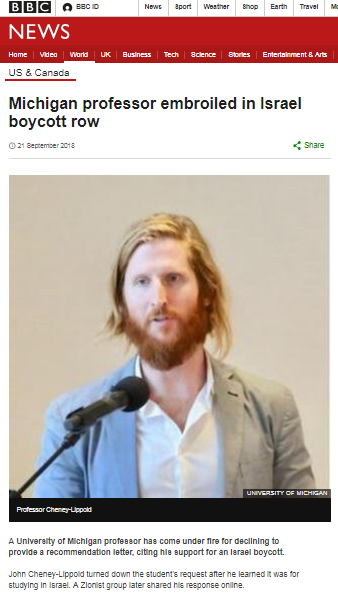Quentin Sommerville’s filmed report for BBC television news late on July 17th (which also appears on the BBC News website’s Middle East page under the title “Israel starts Gaza ground offensive“) got off to a shaky start when he implausibly claimed that:
“Many people here in Tel Aviv probably haven’t even heard the news. The bars are very busy. This is the busiest night of the weekend – of the Israeli weekend, if you like – Thursday night.”
With the vast majority of Israelis having friends, relatives or neighbours serving in the regular army or among the reservists called up since the beginning of Operation Protective Edge – or both – and with Israelis being both notorious news junkies and famously technology savvy, it is highly unlikely that there was any basis to Sommerville’s claim that almost two hours after the ground operation began, “many people” had not “heard the news”.
But happily Sommerville’s report went on to improve as he rightly informed viewers:

“Now the Prime Minister’s office – Benjamin Netanyahu – has made it plain that there is a specific objective of this ground offensive – clearly this is a major escalation of…ah…this ten-day conflict – but that the specific objective is to target tunnels which militants from Gaza have been using to try and enter Israeli territory. A number – we believe thirteen – heavily armed gunmen tried to make it across into Israel to attack a kibbutz this morning at 4:30 a.m. We were down in that area south [sic] of the Gaza Strip this morning.”
However, despite the BBC obviously being aware of the main objective of the ground operation as shown in Sommerville’s report, audiences have so far not been properly informed about the topic of Hamas’ cross-border tunnels. There has so far been no ‘Features & Analysis’ article or no video report explanation of what these tunnels are, how they differ from the other types of tunnels in the Gaza Strip, how, by whom and with what they are built, why they present a threat to Israel and why they cannot be neutralized other than by means of a ground operation.
Clearly, if BBC audiences are to be properly and fully informed with regard to why a ground operation is currently underway, then the information above is imperative and BBC audiences might perhaps have expected to find it in an article by the BBC’s Jonathan Marcus which appeared in the ‘Features & Analysis’ section of the BBC News website’s Middle East page on July 18th under the title “Gaza: What does Israel’s ground offensive aim to achieve?“. However, no significant information is provided by Marcus in that article.
“In the first instance the decision to give the green light to a ground phase may have a relatively limited objective – to seek out and destroy tunnels constructed by Hamas and other groups which they hope to use as a means of infiltrating heavily armed fighters into Israel.
One such operation was thwarted in the early hours of Thursday morning. Some 13 Palestinian fighters emerged from a tunnel between Kerem Shalom and Kibbutz Sufa, east of the Gaza Strip, at around 04:00 (01:00 GMT). Israeli troops quickly intercepted the intruders who took casualties and were forced back into the tunnel.
Infiltration attempts – either via tunnels or by landings on the Israeli coast – have been a relatively new tactic from the Palestinians in this crisis and Israel’s Prime Minister Benjamin Netanyahu made an explicit reference to the tunnels when he announced his decision to give a green light to a ground mission.” [emphasis added]
Of course in actual fact, Palestinian terrorists have been using cross-border tunnels for years.
As we noted here previously, the Hamas tunnel infiltration of July 17th near Kibbutz Sufa mentioned by Sommerville in the above report did not receive any stand-alone reporting from the BBC and was only briefly mentioned in written reports on the BBC News website on the same day.
Although much of the first day of the ground operation focused on locating tunnels, BBC reports from July 18th included only sparse information on that topic – for example here:
“Mr Netanyahu said the ground operation was targeting the Hamas tunnel network, which the Israel military could not do “only from the air”.”
And here:
“He [Netanyahu] said the military was targeting the Hamas tunnel network, which it could not do “only from the air”.” […]
“On Friday, the military announced it had arrested 13 militants and uncovered 10 tunnels since the start of the ground incursion.” […]
“Last night our forces began a ground operation to hit the terror tunnels crossing from Gaza into Israel’s territory,” Mr Netanyahu told a special cabinet session broadcast live on television on Friday.
“It is not possible to deal with the tunnels only from the air.” […]
“Palestinian militants have used tunnels to carry out attacks, some of which have been thwarted by the Israeli military.
On the morning of the ground offensive, the Israeli military intercepted 13 militants who had infiltrated Israel through a tunnel, and were believed to be planning to attack a nearby kibbutz.”
A report from July 19th states only:
Mr Netanyahu insisted that the ground operation was necessary to target a Hamas tunnel network, which the Israel military could not do “only from the air”.
On July 19th another tunnel infiltration took place in the Eshkol region. That incident received three sentences of coverage in paragraphs nine to twelve of an article of the same date titled “Gaza conflict: Casualties mount amid fresh violence” on the BBC News website’s Middle East page.
“The Israeli military said it killed a Palestinian militant after he infiltrated Israel through a tunnel from central Gaza.
The army said he was among several militants armed with machine-guns aiming to carry out a lethal attack on a nearby Israeli community.
An Israeli patrol repulsed the attack, forcing the militants back into Gaza but two Israeli soldiers were wounded in the incident, the Israel Defense Forces (IDF) said.”
In a filmed report broadcast on BBC television news and promoted on the BBC News website’s Middle East page on July 18th under the title “Gaza conflict: UN says number of displaced almost doubles“, Lyse Doucet even went so far as to promote the notion that there are no tunnels.
Doucet: “Israel says its forces are searching for tunnels used by Palestinian militants for cross-border attacks.”
She then asks a group of local men:
“Is there…are there tunnels here used by Hamas? Is there infrastructure? Why is this area being targeted?”
Man: “There are no tunnels. There is nothing in our area here. That is just what they want to tell the other countries to justify this.”
BBC audiences’ understanding of this ground operation cannot be complete if they are not properly informed on the issue of cross-border offensive tunnels and tunnels used to store weapons. So far, the BBC has failed to meet its obligation to inform them adequately regarding that topic.
Related Articles:
BBC not sure cross-border tunnel intended for terror?




